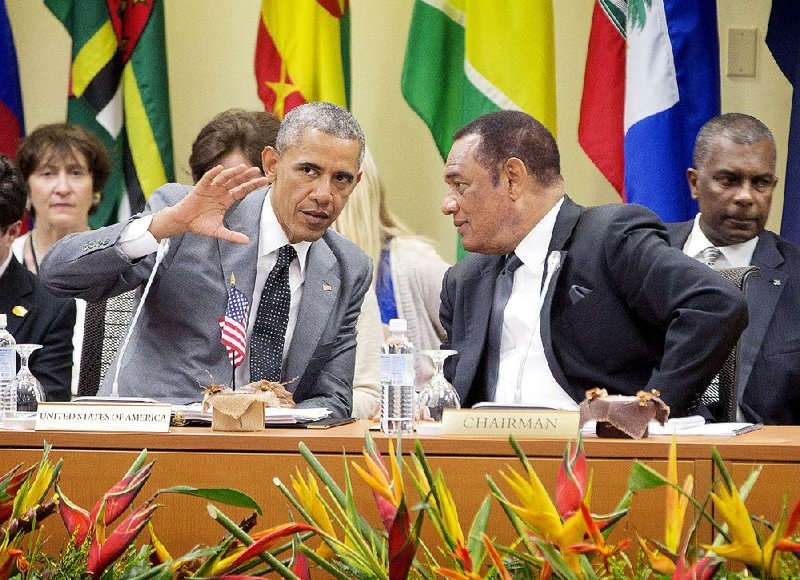KINGSTON, Jamaica -- President Barack Obama will act soon on a recommendation about whether to remove Cuba from the U.S. list of state sponsors of terrorism, he said Thursday as he opened a three-day trip to the Caribbean and Central America.
Obama has long signaled he's willing to take Cuba off the list as part of his broader move to reopen diplomatic relations with the island nation. Havana has eagerly sought removal from the list, but Obama has kept the decision at bay, citing a formal review process that had to be completed by the U.S. State Department.
Speaking after meeting with Jamaican Prime Minister Portia Simpson Miller, Obama said that review is now complete and he's awaiting the actual recommendation from his aides. His decision could come as soon as this week, when Obama and Cuban President Raul Castro are both in Panama to attend the Summit of the Americas.
"Throughout this process, our emphasis has been on the facts," Obama said. "We want to make sure that, given this is a powerful tool to isolate those countries that genuinely do support terrorism, that when we make those designations, we've got strong evidence that's the case, and as circumstance change, that list will change as well."
Cuba is one of just four still on the U.S. list of countries accused of repeatedly supporting global terrorism; Iran, Sudan and Syria round out the list. The designation not only offends Cuba's pride but also restricts Havana's access to credit and financial systems.
Cuba's continuing presence on the list has been a sticking point in the effort to restore ties between the two countries.
Cuba was placed on the terrorism list in 1982 for providing safe haven to members of the Revolutionary Armed Forces of Colombia and of the Basque Fatherland and Liberty group.
According to the State Department's April 2014 Country Report on Terrorism, Cuba's ties to the Basque group have become more distant, with Havana relocating about eight of the two dozen members in Cuba with Spain's cooperation.
Cuba also made efforts throughout 2014 to host and broker peace talks between the Colombian rebels and the government, working with Norway, Colombia, Venezuela and the Red Cross to facilitate the travel of the rebels to Cuba to take part in negotiations.
While the State Department report said there was no indication that Cuba provided weapons or paramilitary training to terrorist groups, it said Cuba continues to harbor fugitives wanted in the U.S.
Obama commented on the first full day of his trip to Jamaica and Panama, where he hopes to make inroads in the face of expanding Chinese influence and weakening power by Venezuela, once the energy juggernaut of the Americas. Simpson Miller thanked Obama for taking action to improve relations with Cuba -- "our closest neighbor."
"We're very happy to say to you, Mr. President, you are on the right side of history," Simpson Miller said.
Obama's travels -- first to Jamaica, then to the Summit of the Americas in Panama -- come after a year of increased attention to the region by the U.S. president. His immigration executive orders, his efforts to slow the influx of Central American minors to the U.S. border and his diplomatic outreach to Cuba have put a foreign-policy spotlight on U.S. neighbors to the south.
Energy security tops Obama's agenda as the U.S. seeks to fill a potential void left by Venezuela's scaled-back oil diplomacy.
At a meeting with other leaders in the 15-member Caribbean Community, Obama announced a $20 million effort to help jump-start private and public sector investment in clean-energy projects in the Caribbean and Central America.
"This region has some of the highest energy costs in the world," Obama said. "Caribbean countries are particularly vulnerable to the effects of climate change. And we have to act now."
In a written interview with EFE News before his arrival in Panama, Obama continued his administration's efforts to soften the effect of his announced sanctions against seven Venezuelans in protest of President Nicolas Maduro's crackdown on political opponents. Maduro has characterized the sanctions as direct aggression against Venezuela.
"We do not believe that Venezuela poses a threat to the United States, nor does the United States threaten the Venezuelan government," Obama said.
Obama's visit to Jamaica is the first by a U.S. president since Ronald Reagan in 1982.
Information for this article was contributed by David McFadden and Josh Lederman of The Associated Press and by Nicole Gaouette, David Lerman and Indira A.R. Lakshmanan of Bloomberg News.
A Section on 04/10/2015
